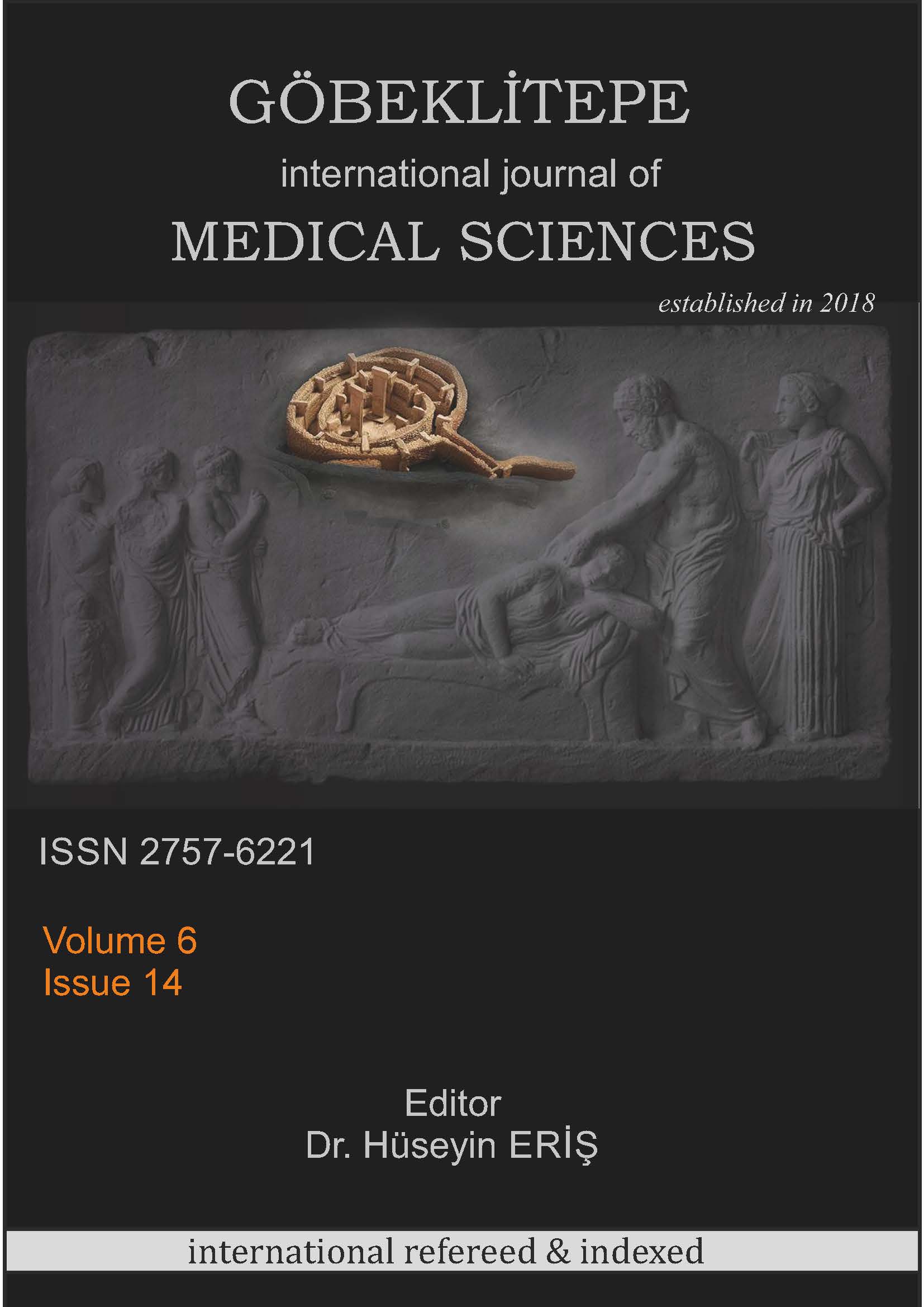The THE RELATIONSHIP BETWEEN PHYSICAL ACTIVITY LEVEL, DYSPNEA AND SLEEP QUALITY IN CHRONIC OBSTRUCTIVE PULMONARY DISEASE PATIENTS
DOI:
https://doi.org/10.55433/gsbd.255Keywords:
Kronik Obstrüktif Akciğer Hastalığı, Fizikel Aktivite, Dispne, Uyku Kalitesi, HemşirelikAbstract
The study was conducted to determine the relationship between physical activity level and dyspnea and sleep quality in patients with Chronic Obstructive Pulmonary Disease.The research was conducted in the form of a descriptive study with 128 patients who applied to the chest diseases polyclinic of an university training and research hospital between July 2022 and December 2022 and met the inclusion criteria of the study. The data of the study were collected with “Personal Information Form”, “International Physical Activity Questionnaire”, “Modified Borg Scale”, and “Chronic Obstructive Pulmonary Disease and Asthma Sleep Impact Scale”. Number, percentage, mean, Mann Whitney U, Kruskall Wallis, and Spearman correlation tests were used in the statistical analysis of the data. The Mann-Whitney U and dual post hoc tests were applied.There was a statistically significant difference between age and physical activity score, presence of an additional chronic disease and physical activity and sleep scale scores, marital status and dyspnea scale scores (p<0.05). In addition, a statistically significant difference was found between physical activity category mean scores and dyspnea and sleep scores (p<0.05). In the correlation analysis, it was found that as the physical activity level increased, dyspnea and sleep scale scores decreased, and as the dyspnea scale score increased, the sleep scale score increased (p<0.01).In order to reduce dyspnea and improve sleep quality of patients with Chronic Obstructive Pulmonary Disease, it is recommended that nurses include a programmed physical activity training plan in their nursing care plans, encourage patients and take care in implementing it.
References
REFERENCES
Rabe, K.F.(2007). Global Initiative for Chronic Obstructive Lung Disease. Global strategy for the diagnosis, management, and prevention of chronic obstructive pulmonary disease, GOLD executive summary, Am J Respir Crit Care Med,176, 532-555.
Lamprecht, B. McBurnie, M,A. Vollmer W,M. & Gudmundsson G.(2011). COPD in never smokers: results from the population-based burden of obstructive lung disease study, Chest, 139(4), 752-763.
Van Dijk W, Tan W, Li P,Guo, B,Li, S, Benedetti A, Bourbeau, J. & CanCOLD Study Group. (2015). COLD Study Group. Clinical relevance of fixed ratio vs lower limit of normal of FEV1/FVC in COPD: patient-reported outcomes from the Can COLD cohort, The Annals of Family Medicine, 13(1), 41-48.
Satman, I. & Erkan, F.(2021). In: Satman I,Erkan F (ed) Türkiye’de Kronik Obstrüktif Akciğer Hastalığının Yönetimi: Korunma, Tanı ve Tedavi Standartları Kılavuzu, İkinci Basım, İstanbul, pp 21-23.
Xiao, J.(2020). Advances İn Experimental Medicine And Biology, Physical Exercise For Human Health,1228. Doi:10.1007/978-981-15-1792-1
Özdemir, F. Koca, T. Berber N. & Şahin, Ş.(2020). Astım ve koah hastalarının fiziksel aktivite düzeylerinin değerlendirilmesi, Ksü Tıp Fak Dergisi, 14(1), 20-23.
Ayhan, E. (2011). Astım ve kronik obstrüktif akciğer hastalığı uyku ölçeğinin kronik obstrüktif akciğer hastalığında geçerlik ve güvenirlik çalışması. (Yüksek lisans tezi). Erzurum, Türkiye, Atatürk Üniversitesi, Sağlık Bilimleri Enstitüsü, 2011.
Lewthwaite, H. Effing, T,W. Olds, T, &Williams, M,T.(2011). Physical activity, sedentary behaviour and sleep in copd guidelines: a systematic review. Chronic Respiratory Disease, 4(3), 231–244. Doi:10.1177 /147997 2316687224
Gökçek, Ö. Doğru Hüzmeli, E. & Katayıfçı, N.(2019). Kronik obstrüktif akciğer hastalarında dispnenin yaşam kalitesi ve depresyona etkisi, ACU Sağlık Bil Dergisi,10(1), 84-88. https://doi.org/10.31067/0.2018.89
10.Bozkurt, C. Akay, B. &Sinmaz T.(2020). Kronik obstrüktif akciğer hastalığı olan bireylerde yorgunluk düzeyi ile uyku kalitesinin ilişkisi, Osmangazi Journal of Medicine, 42(6), 627-638. Doi: 10.20515/otd.655648.
Serin, E.K. Ister E.D. & Ozdemir A.(2020). The relationship between sleep quality and dyspnoea severity in patients with COPD, Afri Health Sci, 20(4), 1785-92. https://dx.doi.org/10.4314/ahs.v20i4.32
12.Ünal Tar E.K.S, Kant, E. &Çetinkaya, F.(2018). The effect of walking exercise on oxygen saturation, dyspnea and happiness in COPD, Patients Journal of Current Researches on Health Sector,8(1), 95-110.
Sağlam, M. Arikan, H. Savci, S. Inal-Ince, D. Bosnak- Güclü, M. & Karabulut E.(2010). International physical activity questionnaire: reliability and validity of the Turkish version, Perceptual and Motor Skills, 111, 278-84.
Borg, G, A,V.(1982). Psychophysical basis of perceived exertion, Medicine and Science in Sports and Exercise. 14: 377-381.
Burdon, J,G. Juniper, E,F. Killian, K,J. Hargreave, F,E. & Campbell, E.J.(1982). The perception of breathlessness ın asthma. The American Review of Respiratory Disease. 126 (5), 825-828.
Pokrzywinski, R,F. Meads, D,M. & McKenna, S,P.(2009). Development and psychometric assessment of the COPD and Asthma Sleep Impact Scale (CASIS). Health Qual Life Outcomes. 7, 98.
17.Ceyhan, Y. & Tekinsoy Kartin, P.(2022). The efects of breathing exercises and inhaler training in patients with COPD on the severity of dyspnea and life quality: a randomized controlled trial, Trials, 23,707. https://doi.org/10.1186/ s13063-022-06603-3.
Kütmeç Yılmaz, C. Duru Aşiret, G. Çetinkaya, F. & Kapucu, S.(2017). Kronik obstürüktif akciğer hastalarında yorgunluğun günlük ve enstrümental aktiviteleri üzerine etkisi, Anadolu Hemşirelik ve Sağlık Bilimleri Dergisi.,20,2.
Liao, Lin-Yu. Chen, Kuei-Min. Chung, Wei-Sheng. & Chien, Jung-Yien.(2015). Efficacy of a respiratory rehabilitation exercise training package in hospitalized elderly patients with acute exacerbation of COPD: a randomized control trial, International Journal of COPD, 10,1703–1709
Çil Akıncı, A. & Pınar, R. (2011). Kronik obstrüktif akciğer hastalarının günlük yaşam aktivitelerini yapma sırasında bağımlılık durumları ve etkileyen faktörler, E-Journal of New World Sciences Academy Medical Sciences, 6(1),9-18.
Spina, G. Spruit, M,A. Alison, J. Benzo, R,P.& Calverley, P,M,A. (2017). Clarenbach CF, et al.,Analysis of nocturnal actigraphic sleep measures in patients with COPD and their association with daytime physical activity, Thorax,0,1–8. doi:10.1136/ thoraxjnl-2016-208900.
Oktay Arslan, B. Sarp Taymaz, Z. Uçar Hoşgör, Z,Z. & Tatar, D. (2020). Stabil KOAH’de uyku kalitesi ve ouas riskinin değerlendirilmesi, Journal of Turkish Sleep Medicine, 3,112-117.
Global Strategy for the Diagnosis, Management and Prevention of COPD (2017). Global Initiative for Chronic Obstructive Lung Disease (GOLD) 2017. Available from:http://goldcopd.org. Erişim Tarihi:12.05.2022.
Moss, M. Franks , M. Briggs P. & Kennedy, D. Global Strategy for the Diagnosis, Management and Prevention of COPD Scholey A.(2005). Compromised arterial oxygen saturation in elderly asthma sufferers results in selective cognitive impairment. J Clin Exp Neuropsychol. 27:139-150.
Global Strategy for the Diagnosis, Management, and Prevention of COPD . (2021). Global Initiative for Chronic Obstructive Lung Disease 2021 Report. https://toraks.org.tr/site/sf/boks /2021/ (accessed 20.12.2022).
Cooper, C,B.(2001). Exercise in chronic pulmonary disease: limitations and rehabilitation, Med Sci Sports Exerc, 33(7), 643-646.
Sharma, S. & Sharma, P.(2019). Prevalence of dyspnea and its associated factors in patients with chronic obstructive pulmonary disease, Indian J Respir Care,8,36-41.
Garcia-Aymerich, J. Lange, P. Benet, M, Schnohr, P. & Anto, J,M.(2006). Regular physical activity reduces hospital admission and mortality in chronic obstructive pulmonary disease: a population based cohort study. Thorax. 61, 772-8.
Helvacı, A. İzgü, N. & Özdemir, L.(2020). Kronik obstrüktif akciğer hastalığı olan bireylerde dispne şiddeti ve etkileyen faktörler, CBU-SBED, 7(3),318-324.
Zammıt, C. Liddicoat. H, Moonsıe. I, & Makker, H. (2010). Obesity and respiratory diseases,Int J Gen Med, 20(3),335-343.
Çalık Kütükcü, E. Arıkan, H. Sağlam, M. Vardar Yağlı, N. İnal İnce, D. Öksüz, Ç. Savcı, S. Düger, T. & Çöplü L. (2015). Kronik obstrüktif akciğer hastalarında çok boyutlu hastalık şiddeti ve günlük yaşam aktiviteleri arasındaki ilişkinin incelenmesi, Journal of Exercise Therapy And Rehabilitation, 2, 53-60.
Suerdem, M. Gunen, H. Akyıldız, L. Cilli, A. Ozlu, T. Uzaslan, E. Abadoglu,Ö. Hasan Bayram, H. Cimrin, A,H. Gemicioglu, B. & Misirligil, Z. (2020). Demographic, clinical and management characteristics of newly diagnosed COPD patients in Turkey: a real-life study. Int J Chron Obstruct Pulmon Dis. 15,261-7.
Sağlam, M. İnce, D. Yağlı, N. Arıkan, H. Kutukcu, E. Karakaya G. & Kalyoncu, F.(2014). Erişkin astımlı bireylerde fiziksel aktivite duzeyi ve etkileyen faktorlerin belirlenmesi. Spor Bilimleri Dergisi Hacettepe Journal of Sport Sciences,25: 132–141.
Holm K,E. Plaufcan M,R. Ford D,W. Sandhaus R,A. Strand M, Strange C. & Wamboldt, F,S. 2014). The impact of age on outcomes in chronic obstructive pulmonary disease differs by relationship status. J Behav Med. 37: 654‑63.
Moy, M,L. Teylan, M. Weston, N,A. Gagnon, D,R. & Garshick, E.(2013). Daily step count predicts acute exacerbations in a us cohort with COPD. PLoS ONE,8(4),e60400. doi:10.1371/journal.pone.0060400.
Kocabaş, A.(2008). Kronik obstrüktif akciğer hastalığı epide¬miyolojisi ve risk faktörleri. In: Bilgiç, H, Karada, M, (ed) Ta¬nıdan tedaviye kronik obstrüktif akciğer hastalığı, Galenos Yayıncılık, Ankara, 1(6), 10-22.
Hillas, G. Perlikos, F. Tsiligianni, I. & Tzanakis, N.(2015). Managing comorbidities in COPD. Int J Chron Obstruct Pulmon Dis, 10,95-109.
Sievi, N,A. Senn, O. Brack, T. Brutsche, M,H. Frey, M. Irani, S, Leuppi, J,D. Thurnheer, R. Franzen, D. Kohler, M. & Clarenbach, C,F.(2015). Impact of comorbidities on physical activity in COPD, Respirology, 20,413–418. doi:10.1111/resp.12456.
Maltais, F. (2013). Exercise and COPD: therapeutic responses, disease-related outcomes, and activity-promotion strategies, The Physician and Sportsmedicine, 41(1),66–80. doi:10.3810/psm.2013.02.2001.
Vardar Yağlı, N. Çalık Kütükçü, E. Sağlam, M. İnce, D. Arıkan, H. & Cöplü L.(2018). The relationship between fear of movement, pain and fatigue severity, dyspnea level and comorbidities in patients with chronic obstructive pulmonary disease, Disability and rehabilitation, 1-5.
Global Initiative for Chronic Obstructive Lung Disease (2015). Global strategy for the diagnosis, management and prevention of chronic obstructive pulmonary disease. (updated 2015 Jan; cited 2015 April 10). Available from: http://www.goldcopd.org (accessed 24.12.2022).
Cavaillès, A. Brinchault-Rabin, G. & Dixmier A.(2013). Goupil F, Gut-Gobert C, Marchand-Adam S, et al., Comorbidities of COPD, Eur Respir Rev, 22,454–475.
Van Remoortel, H. Hornikx, M. Langer, D. Burtin, C. Everaerts, S. Verhamme, P. Boonen, S. Gosselink, R. Decramer, M. Troosters, T. & Janssens, W.(2014). Risk factors and comorbidities in the preclinical stages of chronic obstructive pulmonary disease, Am. J. Respir. Crit. Care Med, 189,30–8.
Bülbül, Y.(2013). Kronik obstrüktif akciğer hastalığında uyku sorunları. Güncel Göğüs Hastalıkları Serisi, 1(1), 80-85.
Yohannes, A,M. & Alexopoulos, G,S. (2014). Depression and anxiety in patients with COPD, Eur Respir Rev, 23, 345-349. https://doi.org/10.1183/ 09059 180. 00007813.
Vogelmeier, A,F. Roman-Rodríguez, M. Singh, D. Han, M,K. Rodríguez-Roisin, R. & Ferguson, G,T. Goals of COPD treatment: Focus on symptoms and exacerbations, Respiratory Medicine,2020, 166, 1-7. https://doi.org/ 10. 1016/ j.rmed.2020.105938.
Karagülle, Ç. & Can Çiçek, S.(2014).Kronik obstrüktif akciğer hastalığı olan bireylerin hastalık algısının yaşam kalitesine etkisi, Türk Fen ve Sağlık Dergisi, 1(2), 36-49.
Arslan, C. & Ünsar, S.(2021). Kronik obstrüktif akciğer hastalarında dispne algısı ve yaşam kalitesinin değerlendirilmesi, Anadolu Hemşirelik ve Sağlık Bilimleri Dergisi, 24(1),42-50. https://doi.org/ 10.17049/ataunihem.732692.
Chen, R,Tian, J.W, Zhou, L.Q, Chen, X, Yan, H.Y, Zeng, B, Zhang , M,S. (2016). The relationship between sleep quality and functional exercise capacity in COPD, Clin Respir J, 10,477-85.
Nunes, D,M. Mota, R,M. de Pontes Neto O,L. Pereira, E,D. de BruiN, V,M. & de Bruin P.F.(2009). Impaired sleep reduces quality of life in chronic obstructive pulmonary disease, Lung, 187,159-63. 22.
Scharf, S. Maimon, N. & Simon-Tuval, T.(2011). Bernhard-Scharf, B, Reuveni, H, Tarasik, A, Sleep quality predicts quality of life in chronic obstructive pulmonary disease, Int J Chron Obstruct Pulmon Dis, 1,1–12.
Vicdan, A. (2018). Kronik obstrüktif akciğer hastalarının uyku kalitesinin değerlendirilmesi.DEUHFED. 11(1): 14-18.
Stege G. Vos ,P,J,E. van den Elshout, F,J,J. Dekhuijzen, P,N,R. van de Ven, M,J,T. & Heijdra, Y,F. (2008). Sleep, hypnotics and chronic obstructive pulmonary disease, Respir Med, 102, 801-14.
54.Kauffman, K,S. Doede, M. Diaz-Abad, M. Scharf, S,M. Bell-Farrell, W. Rogers, V,E. & Geiger-Brown, J. (2014).Experience of insomnia, symptom attribution and treatment preferences in individuals with moderate to severe COPD: a qualitative study, Patient Prefer Adherence, 8,1699-704. doi: 10.2147/PPA.S71666
Omachi, T,A. & Blanc, P,D.(2012). Claman, D.M, Chen, H, Yelin, E.H, Julian, L, Katz, P.P, Disturbed sleep among COPD patients is longitudinally associated with mortality and adverse COPD outcomes, Sleep Medicine, 13(5), 476–483.
Nahla, S,K. Narwa, F,M. Nagwa, Y,A.(2019). Sleep quality among patients with chronic obstructive pulmonary disease at a university hospital in Egypt, Clin. Pract, 16(2), 1085-1092.
Downloads
Published
How to Cite
Issue
Section
License
Copyright (c) 2024 Göbeklitepe Sağlık Bilimleri Dergisi

This work is licensed under a Creative Commons Attribution 4.0 International License.




